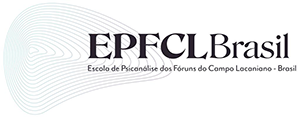In psychoanalysis, does anxiety (angst) have a logic?
Introducing a modal logical reading of anxiety into treatment direction
DOI:
https://doi.org/10.31683/stylus.v1i49.1130Keywords:
Psychoanalysis, Anxiety, Modal logic, TreatmentAbstract
Starting from the hypothesis that the relationship with anxiety (angst) changes as an analysis progresses, in this article we propose to follow, in an introductory way, the logical developments of anxiety into treatment direction based on Lacan’s elaborations on the modal logic. When reviewing the place of anxiety in the theories of Freud and Lacan, the consideration of its central role in the subjective constitution allows us to attribute to anxiety the logical status of the necessary, not only in the formation of the subject, but in the direction of an analysis too. However, the dismantling of fantasy would be homologous to another relationship with the drive field, which would imply a clinical and logical turn in the relationship with anxiety: from a necessary anxiety, to a possible one. The logical passage from necessary to possible, would require clinical consideration of the impossible inherent to non-whole phallic logic. Thus, it would be possible to sustain, at the end of an analytical treatment, a possible anxiety, which allows, in Freud’s terms, to love and to work, and, in Lacan’s terms, to desire and to enjoy.
Downloads
References
Bispo, F. S., & Couto, L. F. S. (2011). Ética da psicanálise e modalidades de gozo: considerações sobre o Seminário 7 e o Seminário 20 de Jacques Lacan. Estudos de Psicologia, 16(2), 121-129. Recuperado de http://old.scielo.br/pdf/epsic/v16n2/v16n2a02.pdf
Coscarelli, B. C. (2008). Introdução à lógica modal. Dissertação de mestrado. Instituto de Matemática e Estatística. Universidade de São Paulo. São Paulo. Brasil.
Freud, S. (1996). Estudos sobre a histeria (J. Strachey, Trad.). In J. Strachey (Ed.), Edição standard brasileira das obras psicológicas completas de Sigmund Freud (Vol. 2, pp. 1-335). Rio de Janeiro: Imago. (Trabalho original publicado em 1895)
Freud, S. (2014). Obras completas, volume 17: Inibição, sintoma e angústia, O futuro de uma ilusão e outros textos (1926-1929) (P. C. de Souza, Trad.) (1a ed.). São Paulo: Companhia das Letras. (Trabalho original publicado em 1926-1929)
Freud, S. (2018). Análise terminável e interminável (P. C. de Souza, Trad.). São Paulo: Companhia das Letras. (Trabalho original publicado em 1937)
Lacan, J. (1998). A significação do falo. In J. Lacan. Escritos (pp. 692-703). Rio de Janeiro: Jorge Zahar. (Trabalho original publicado em 1958)
Lacan, J. (2004). O seminário, livro 10: a angústia (M. D. Magno, Trad.). Rio de Janeiro: Zahar. (Trabalho original publicado em 1962-1963)
Lacan, J. (2008). O seminário, livro 20: mais, ainda. (M. D. Magno, Trad.). Rio de Janeiro: Zahar. (Trabalho original publicado em 1972-1973)
Pacheco, A. L. P. (2012). Por uma prática sem valor: a suficiência e a conveniência poética do psicanalista. Livro Zero: Revista de Psicanálise – O sintoma: sua política, sua clínica, São Paulo: FCL-SP/EPFCL-Brasil, 1(2), 85-100.
Santos, J. V. (2020). Significantes mal-comportados: o fantasma e a lógica paraconsistente. Dissertação de mestrado em psicologia clínica. Instituto de Psicologia. Universidade de São Paulo. São Paulo. Brasil.
Downloads
Published
How to Cite
Issue
Section
License
Ao encaminhar os originais, os autores cedem os direitos de publicação para STYLUS.
Os autores assumem toda responsabilidade sobre o conteúdo do trabalho, incluindo as devidas e necessárias autorizações para divulgação de dados coletados e resultados obtidos, isentando a Revista de toda e qualquer responsabilidade neste sentido.



